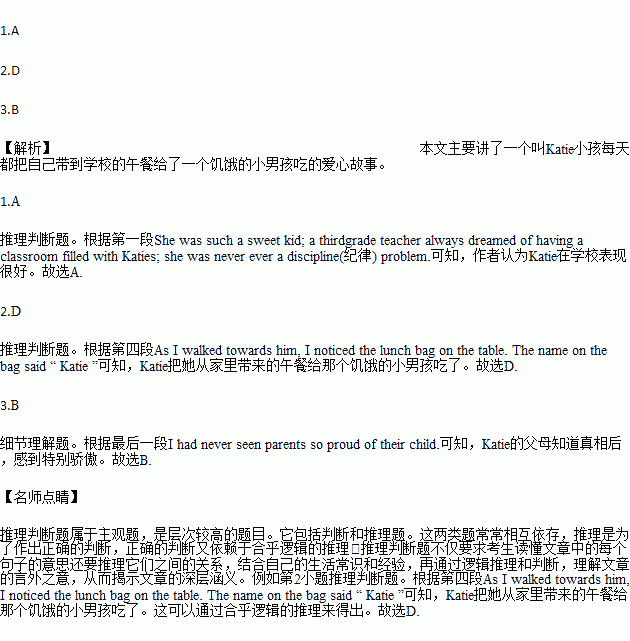题目内容
Katie was in big trouble.She was such a sweet kid; a third?grade teacher always dreamed of having a classroom filled with Katies; she was never ever a discipline(纪律) problem. I just couldn't imagine why she had made her parents so angry.
It seemed that Katie had been running up sizable charges in the lunchroom.Her parents explained that Katie brought a great homemade lunch each day, and there was no reason for her to buy school lunch. They assumed a sit?down with Katie would solve the problem, but failed.So they asked me to help them get to the bottom of this situation.
So the next day, I asked Katie to my office.“Why are you charging lunches, Katie? What happened to your homemade lunch?” I asked. “I lose it,” she responded. I leaned back in my chair and said, “I don't believe you, Katie.” She didn't care.“Is someone stealing your lunch, Katie?” I took a new track. “No.I just lose it,” she said.Well, there was nothing else I could do.
The problem was still unsolved the next week when I noticed a boy who was new to the school sitting alone at a lunch table. He always looked sad.I thought I would go and sit with him for a while.As I walked towards him, I noticed the lunch bag on the table. The name on the bag said “ Katie ” .
Now I understood and I talked to Katie.It seemed that the new boy never brought a lunch, and he wouldn't go to the lunch line for a free lunch.He had told Katie his secret and asked her not to tell anyone that his parents wanted him to get a free lunch at school. Katie asked me not to tell her parents, but I drove to her house that evening after I was sure that she was in bed. I had never seen parents so proud of their child.Katie didn't care that her parents and teacher were disappointed in her.But she cared about a little boy who was hungry and scared.
Katie still buys lunch every day at school. And every day, as she heads out of the door, her mom hands her a delicious homemade lunch.
1.What did the author think of Katie?
A. She performed well at school.
B. She was a girl filled with love.
C. She often made trouble at school.
D. She used to be a discipline problem.
2.Why did Katie eat school lunch instead of her homemade lunch every day?
A. She lost her homemade lunch.
B. She had her homemade lunch stolen.
C. She didn't like the taste of her homemade lunch.
D. She gave her homemade lunch to a hungry boy.
3.What was Katie's parents' reaction to the truth about the lunch?
A. They were very angry.
B. They were proud of Katie.
C. They were disappointed.
D. They were rather upset.



 be
be